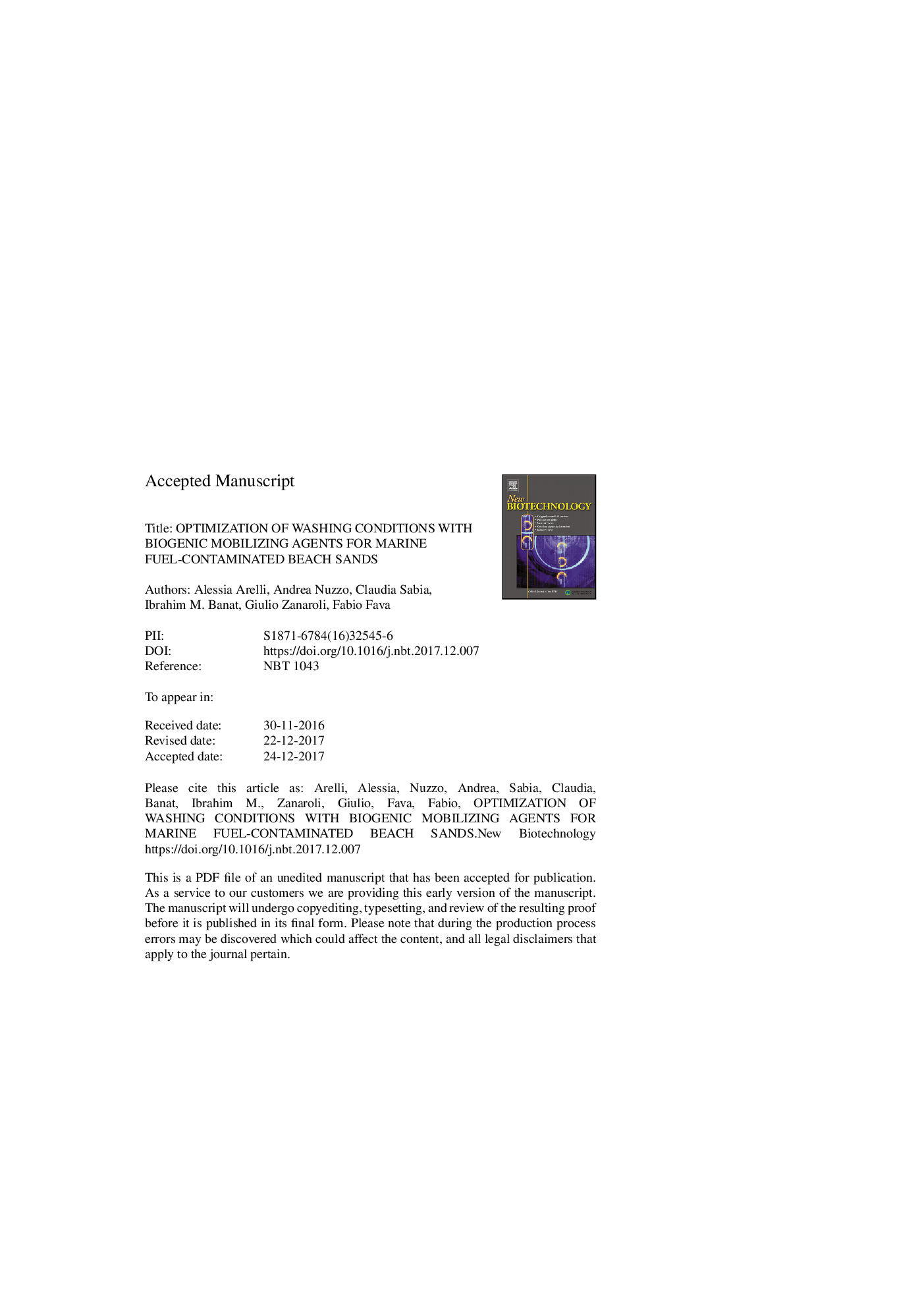| کد مقاله | کد نشریه | سال انتشار | مقاله انگلیسی | نسخه تمام متن |
|---|---|---|---|---|
| 6494811 | 1418371 | 2018 | 39 صفحه PDF | دانلود رایگان |
عنوان انگلیسی مقاله ISI
Optimization of washing conditions with biogenic mobilizing agents for marine fuel-contaminated beach sands
ترجمه فارسی عنوان
بهینه سازی شرایط شستشو با عوامل بسیج زیستی برای ماسه های ساحل دریایی آلوده به دریایی
دانلود مقاله + سفارش ترجمه
دانلود مقاله ISI انگلیسی
رایگان برای ایرانیان
کلمات کلیدی
شن و ماسه، ماسه ساحل، روش سطح پاسخ، سوخت دریایی، نشت نفت، بیوسورفکتانت،
موضوعات مرتبط
مهندسی و علوم پایه
مهندسی شیمی
بیو مهندسی (مهندسی زیستی)
چکیده انگلیسی
Washing is a rapid and effective treatment to remediate contaminated sands impacted by oil spills, although synthetic additives used to increase extraction efficiency may cause additional pollution issues due to their intrinsic toxicity and very often low biodegradability. In this study, different biogenic mobilizing agents (soybean lecithins, cyclodextrins, cholic acids, plant-derived cleaners, rhamnolipids and sophorolipids) were tested in the washing of beach sands artificially contaminated with the Intermediate Fuel Oil IFO-180. Among these, a de-oiled soybean lecithin (SL-1), hydroxypropyl-β-cyclodextrins (HPB-CD) and sophorolipids (SR) achieved hydrocarbon removals close to those attained with the synthetic surfactant Triton⢠X-100 (TX) in preliminary washing tests carried out at constant mixing rate, water/sand ratio and IFO-180 contamination level using agents concentrations close to their critical micelle concentration (0.1% and 1% w/v for microbial and non-microbial agents, respectively). The effects of agent concentration, water/sand ratio, mixing rate and IFO-180 contamination on hydrocarbons removal were modelled using face-centred central composite design and ANOVA. Optimal washing parameters for sand contamination levels in the range 0.5-20â¯g/kg were identified with response surface methodology. While HPB-CD and SR performed equally to TX only at low sand contaminations, SL-1 attained hydrocarbon removal higher or equal to that of TX at any IFO-180 contamination and at lower application rates. SL-1 also outperformed TX when minimizing the water/sand ratio, i.e., the volume of water used. Considering its lower toxicity, higher biodegradability and higher hydrocarbon removal efficiencies, SL-1 is an effective and environmentally sustainable alternative to synthetic surfactants in washing treatments for marine fuel-contaminated sands.
ناشر
Database: Elsevier - ScienceDirect (ساینس دایرکت)
Journal: New Biotechnology - Volume 43, 25 July 2018, Pages 13-22
Journal: New Biotechnology - Volume 43, 25 July 2018, Pages 13-22
نویسندگان
Alessia Arelli, Andrea Nuzzo, Claudia Sabia, Ibrahim M. Banat, Giulio Zanaroli, Fabio Fava,
